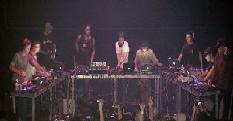- Groovetrackers
- Archive
- Artists

NAROD NIKI is based on Ricardo Villalobos' idea to combine international masterminds of minimal techno for a one-time improv-techno-all-star band. Using a special variation of Ableton's Live software for synchronisation, this on-the-fly monster-jam will transform the Volksbühne theatre into one big dance-floor.
NAROD NIKI has been realized only once before, at the Mutek Festival in Montréal 2003. Hours of powerful beats and sparkling ideas left nothing but exhausted bodies, open mouths and overwhelmed musicians. A cutting-edge experiment – with Thomas Franzman (Dimbiman), Dandy Jack, Cabanne, Akufen, Luciano, Richie Hawtin, Dan Bell, Ricardo Villalobos and with Robert Henke (Monolake) operating the central mixer, which John Berry – at that time the North American manager of Force Inc. – enthusiastically commented as "the most important thing to happen to techno in 10 years.“
NAROD NIKI is an idea as simple as ingenious, that can only be born in one of those inspired morning hours after a long rocked-out night. There are many talented electronic musicians out there happy to collaborate and improvise – but there are hardly any opportunities. With NAROD NIKI, a flexible and open platform has been created by placing the individual artist's identity behind communication, collectivity, skills and shared expertise.
Narodniki (Russian for „friends of the people“) was the name for idealistic Russian social-revolutionary intellectuals who in the 1860s-1890s left their surroundings to secretly live and work with the working class in order to infect the rural population with the idea of revolution. Most of these intellectuals were discovered and killed or sentenced to exile. For the Narodniki, the rural village community was the sprouting seed of the coming socialism. And though they ultimately failed ended as a terrorist movement and under massive repression, it was the Narodniki who spread the roots for the first Russian revolution in 1905.
The project has a special relation to both Mutek and club transmediale, as most of the involved musicians have presented solo shows at either one or both festivals. And though we are not allowed yet to give the names of those who will plug in their machines at this second NAROD NIKI formation at the Volksbühne, be assured that we all know them – and love them.
NEW FORMS OF COLLABORATION
The music industry often complains about the economic consequences of culural techniques such as file-sharing. For musicians, on the other hand, these techniques create innovative forms for production and artistic collaboration. New technical opportunities always generate new artistic practices in a new social context.
From this perspective, the cross-over between music and technology cannot be reduced to its economic value. With its power to form networks, scenes, and all kinds of communities, music is often a catalyst of social transformation. And despite – or maybe even because – of its unavoidable ties to commercial distribution, music is a cultural phenomenon first of all.
NAROD NIKI addresses one of the central problems of minimal techno as well as other areas of the music industry: lack of cooperation. In the words of Richie Hawtin: "Collaboration has to be the way to help electronic music grow again … It's another way of progressing things. The last couple of years, it seemed as if people were getting a little too serious about things and being closed off and not sharing ideas. There has to be a greater openness within this sort of music. If you share your ideas, you can go much further, much faster."
NAROD NIKI stands for the best traditions of techno itself. The creation process of techno music has always been tied to the idea of artistic innovation within open social situations. But the original spirit has been lost. At a time when techno has become a replaceable format, NAROD NIKI reconstructs its original idea under the conditions of up to date software and technology.